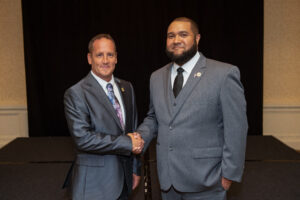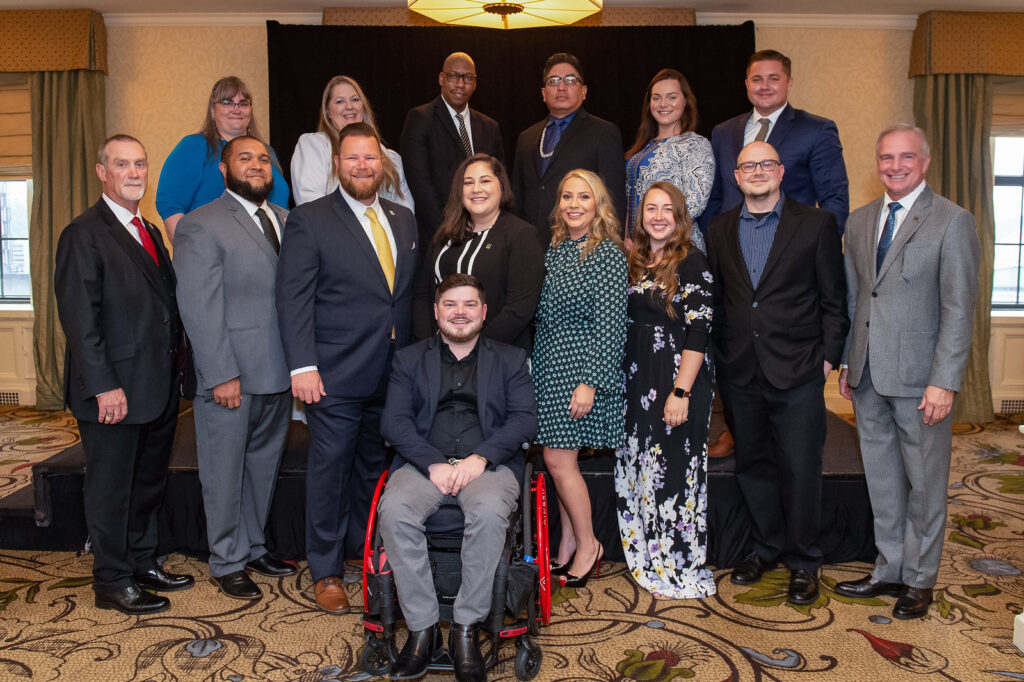
Board Shadow Program participant Greg Gilbert
Encouraging and inspiring tomorrow’s leaders: Board Shadow Program participant Greg Gilbert
When Greg Gilbert left Connecticut to study architecture in Boston, he could not have predicted that he would one day develop a strong interest in code development and safety. Now a building code plan reviewer for the city of Portland in Maine, Gilbert made a few stops before finding his way there.

“I went to school for architecture and worked at an architecture firm when I got out of school,” he said. “Then the economic crash of 2008–2009 hit, and I left that firm. After a little while, I started doing some project managing for a couple of different companies, and then I made my way down to New York City.”
Some of Gilbert’s friends from school were living in New York, which is what drew him there initially. He met up with his former classmates and found a job working for a site safety company.
“New York City requires all high-rise and major buildings to have site safety plans,” Gilbert said. “It’s a really big thing there. So there I was, doing site design and safety planning.”
Pursuing a career in code development and building safety
After a few years in New York City, Gilbert was ready for a change. He headed north to Maine and interviewed with a few architecture and engineering firms. When an architect friend suggested that he look into the public sector because of his experience in New York, he saw an opening with the Permitting and Inspections Division for the city of Portland and applied.
“I met with the folks in Portland and hit it off with them, and that’s how I got into this,” he explained. “I knew my way around plans and buildings, so it all just fell into place.” Gilbert started working for the city of Portland in August 2016.
The Board Shadow Program and the importance of collaboration
Last year, when International Code Council Board Director Steve McDaniel was considering candidates for the Code Council’s Board Shadow Program, Gilbert’s name made it onto his list. McDaniel had reached out to Code Council Board Director Ben Breadmore and Maine State Building Official Paul Demers for ideas. Both recommended Gilbert.
“Paul [Demers] asked me if I had any interest in being a board shadow for an ICC board member and I said, ‘Well, I don’t really know what that entails, but, sure, let me think about it,’” Gilbert said. “I looked into it a little bit and decided it sounded like something that would be beneficial and help me gain knowledge on the inner workings of the ICC and code development. So, I jumped on board and it took off from there.” Gilbert called McDaniel to introduce himself, and the two agreed that it seemed like a good fit.
Gilbert had attended state and regional meetings and conferences but participating in the 2021 International Code Council Annual Conference in Pittsburgh, Pennsylvania, as part of the Board Shadow Program was a new experience for him.
“I would absolutely recommend it,” he remarked. “It was a huge help. Not only learning about the behind-the-scenes processes but you also meet all these other people that are in the same boat as you. Some have a little more experience, and maybe some have a little less experience, and you can help one another. I’ve met at least 50 people now that I can reach out to from time to time. Even though they’re not in my jurisdiction, they can give me their take on certain things. Or, they can give me ideas on how to go about doing other things. It was definitely a great experience.”
Recognizing opportunities through the code development process
The highlight of the conference for Gilbert was attending the code hearings. It ignited and solidified his interest in getting more involved with code development.
“The code hearings were great! You attend and participate and something comes up that resonates with you. Maybe it’s an issue you’ve dealt with before and you can see how other people feel about it,” he shared. “They give their input — for or against it — and you form opinions. It was definitely one of the big selling points for me continuing on this field. Seeing these issues that I have while I’m reviewing plans or out in the field, how other people deal with them, and what other people think about them. Now, I’m interested in trying to make code changes and getting more involved with the actual development aspect of code.”
Before attending the code hearings, Gilbert kept updated on what new projects were coming to town, watched the development, and was part of the construction process. Now, he is thinking of ways to make things better for the future. One example was in improving safety protocols for occupied buildings. He noticed that the International Building Code (IBC) and International Fire Code (IFC) do not outline specific protocols for these situations.
“That’s something that I’ve been thinking about, looking into, and trying to develop some language to have instituted in either the IFC or IBC Chapter 33 as far as construction safety goes,” Gilbert said. “There is construction in occupied buildings everywhere, but no one is actually going to shut down a building — depending on the level of construction — in order to do that work. They’ll separate stuff, but there isn’t really anything that specifies protocols for that. That code development aspect is what I’m interested in focusing on.”
Building safety professionals should recognize opportunities
While Gilbert didn’t know that his initial interest in architecture would lead him to a passion for building safety and codes, he is excited about the path he is on now. He recognizes that careers in the industry may not be on the radars of many young people yet but thinks that awareness and a glimpse into the diverse career possibilities could generate interest.
“Getting people to that point [of being interested in this industry] is a big issue,” he said. “I can see where people want to be plumbers and electricians because that’s trades work. This isn’t really something that might necessarily draw people. It’s not very glamorous or well-known. After I worked in New York doing safety design, it became a huge part of construction for me — preventing accidents and making buildings safer while they’re occupied.”
For those interested in pursuing a career in building safety and code enforcement, Gilbert advocates learning more about the work of the International Code Council based on his own experience. “If you are lucky enough to get into the board shadow program or attend the hearings, make sure you go and be open to everything. Keep your eyes open. Keep your ears open. Try to absorb as much as you can. There is a lot of information and a lot of people to meet. Everyone is willing to help.”
After attending the annual conference and code hearings in Pittsburgh, Gilbert joined the Emerging Leaders Membership Council. He also attended the 2022 Committee Action Hearings in Rochester, New York, and will attend the 2022 ICC Council Annual Conference, Hearings and Expo in Louisville, Kentucky, in September. He is grateful to his colleagues for nominating him for the Board Shadow Program and wants to make the most of the experiences and connections it provided.
“I didn’t want to squander the opportunity,” he said. “So, I’m diving in headfirst.”

| To help facilitate inclusive, collaborative relationships between seasoned code professionals and emerging industry leaders, the International Code Council created its Board Shadow Program — part of its successful Safety 2.0 initiative — which provides an opportunity for emerging code professionals to “shadow” the Code Council Board of Directors at its annual conference and public comment hearings, to intercept and absorb information and experience real-time leadership as they observe their board mentors.
Now in its fifth year, the program provides an opportunity for the Code Council board to connect to diverse emerging professionals from different socio-demographic backgrounds and enables senior leaders to hear a different level of thinking to real-time issues facing young code professionals today. The board gets a much broader range of views on strategic, complex and critical issues, and a feedback loop of challenge, solution, development and learning is created. The program demonstrates the benefits of investing in future code development leaders and helps create a diverse pipeline of “ready-to-go” leaders who understand and are already contributing to the construction industry. |








